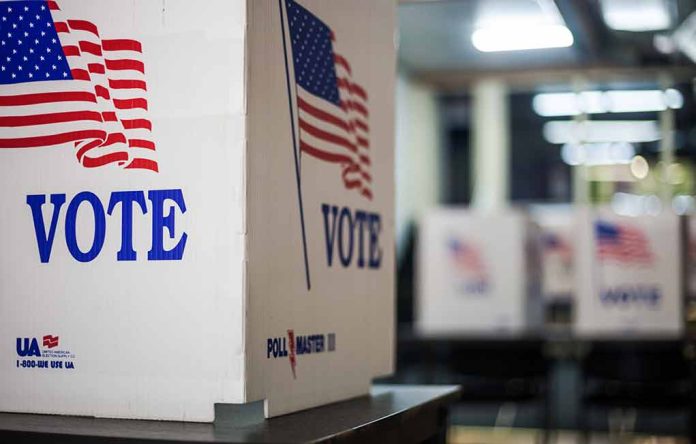
Republicans push for voter ID laws and citizenship proof requirements to secure elections, sparking debate on voter access and integrity.
At a Glance
- Republicans aim to overhaul U.S. voting procedures with proposed legislation
- Key bills include the American Confidence in Elections Act (ACE) and Safeguard American Voter Eligibility Act (SAVE)
- GOP argues these measures are necessary to restore public confidence in elections
- Democrats oppose the changes, claiming they restrict voting rights
- Georgia’s audits found minimal noncitizen voting, supporting current verification processes
Republican Push for Voter ID and Citizenship Proof
The Republican Party is gearing up for a significant overhaul of U.S. voting procedures, leveraging their control of the White House and Congress. At the forefront of this initiative are stricter voter ID requirements and mandates for proof-of-citizenship, which the GOP believes are crucial to safeguarding electoral processes against potential fraud. These proposed changes are embodied in two key pieces of legislation: the American Confidence in Elections Act (ACE) and the Safeguard American Voter Eligibility Act (SAVE).
Republican Rep. Bryan Steil, who chairs the Committee on House Administration, which handles election-related legislation, is a key proponent of these reforms and emphasizes the importance of this moment. “As we look to the new year with unified Republican government, we have a real opportunity to move these pieces of legislation not only out of committee, but across the House floor and into law. We need to improve Americans’ confidence in elections,” Steil stated.
Republicans push for major voting changes, including voter ID and proof-of-citizenship, sparking debate over election trust and integrity. https://t.co/yuEFC9UQy4
— WUSA9 (@wusa9) December 26, 2024
The SAVE Act and Proof of Citizenship
The SAVE Act, which has already passed the House but is currently stalled in the Democrat controlled Senate, requires proof of citizenship for voter registration. Republicans argue that the current voter registration process relies too heavily on an “honor system” and needs to be more stringent. They claim this measure is necessary to prevent non-citizens from voting and to restore public confidence in the electoral system.
Georgia Secretary of State Brad Raffensperger, a supporter of voter ID and proof of citizenship requirements, points to his state’s experience as evidence of the effectiveness of such measures. “What we’ve done by doing those audits is give voters confidence that we do not have noncitizens voting here in Georgia. And when society is highly polarized, you have to look at building trust. Trust is the gold standard,” Raffensperger explained.
Democratic Opposition and Concerns
Democrats, however, strongly oppose these measures, arguing that they restrict voting rights and make it harder for people to vote. Rep. Joe Morelle, representing the Democratic perspective, stated, “Our view and the Republicans’ view is very different on this point. They have spent most of the time in the last two years and beyond really restricting the rights of people to get to ballots – and that’s at the state level and the federal level. And the SAVE Act and the ACE Act both do that – make it harder for people to vote.”
Democrats advocate for alternative measures, such as increased federal funding for election offices and limiting foreign money in U.S. elections. They also criticize GOP claims of widespread noncitizen voting, stating that such claims have diminished post-election.
State-Level Insights and Future Considerations
Georgia’s experience with voter audits has provided valuable insights into the issue of noncitizen voting. The state’s audits have found few cases of noncitizen voting, which supporters of the current system argue demonstrates the effectiveness of existing verification processes. This data point has become central to the debate over the necessity and potential impact of the proposed reforms.
Debate is also being had about eliminating early voting, a move election officials warn against, arguing it would limit voting access. Michigan Secretary of State Jocelyn Benson opposes such a move, advocating for the continuation of early and mail voting options. Both Georgia and Michigan officials highlight the security and accuracy of elections in their states under current systems.
As Republicans prepare to attempt to implement these changes with their unified government, the coming months are likely to see intense debate over the balance between electoral integrity and voter access. The outcome of this legislative push could significantly shape the landscape of American elections for years to come.






















